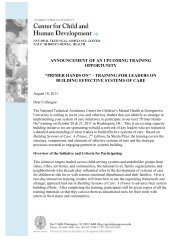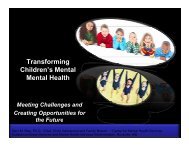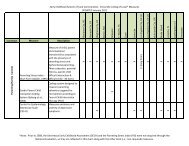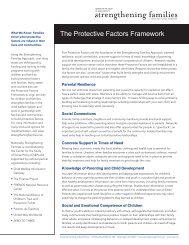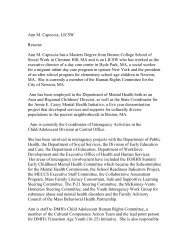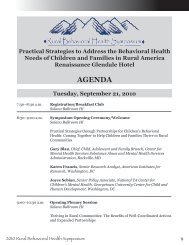Training Institutes 2012 - National Technical Assistance Center for ...
Training Institutes 2012 - National Technical Assistance Center for ...
Training Institutes 2012 - National Technical Assistance Center for ...
Create successful ePaper yourself
Turn your PDF publications into a flip-book with our unique Google optimized e-Paper software.
INSTITUTES<br />
The faculty team and resource person offer diverse perspectives including experts in cultural and linguistic competence,<br />
multilingual representatives from national ethnic-specific organizations concerned with behavioral health, and the Chief<br />
of Staff and Senior Advisor <strong>for</strong> the Office <strong>for</strong> Civil Rights, U.S. Department of Health and Human Services.<br />
MODERATOR/PRESENTER: Tawara Goode, M.A., Director and Assistant Professor, <strong>National</strong> <strong>Center</strong> <strong>for</strong> Cultural<br />
Competence, Georgetown University <strong>Center</strong> <strong>for</strong> Child and Human Development, Washington, DC<br />
Juliet Choi, J.D., Chief of Staff & Senior Advisor, Office of Civil Rights, U.S. Department of Health and Human<br />
Services, Washington, DC<br />
DJ Ida, Executive Director, <strong>National</strong> Asian American Pacific Islander Mental Health Association, Denver, CO<br />
Wendy Jones, M.Ed., M.S.W., Director, Children and Youth with Special Health Care Needs, <strong>National</strong> <strong>Center</strong> <strong>for</strong><br />
Cultural Competence, Georgetown University <strong>Center</strong> <strong>for</strong> Child and Human Development, Washington, DC<br />
Fred Sandoval, Operations Manager, <strong>National</strong> Latino Behavioral Health Association, Cochiti Lake, NM<br />
INSTITUTE #12 1:30 PM THURSDAY • 8:30 AM SATURDAY • ORANGE BLOSSOM<br />
Partnerships Between Education and Behavioral Health: Implementing Positive Behavioral<br />
Interventions and Supports (PBIS) and Wraparound in Schools<br />
OBJECTIVES—Participants will learn:<br />
1. To describe how the evidence-based practice of PBIS can be introduced and strategies <strong>for</strong> supporting<br />
and sustaining PBIS<br />
2. To explain how a children’s behavioral health system can build relationships with school-based PBIS to increase<br />
access to mental health supports in schools<br />
3. To identify the key components of a model <strong>for</strong> work<strong>for</strong>ce development in school-based wraparound<br />
4. To create a draft blueprint <strong>for</strong> systems change in their home community/state to build partnerships between<br />
behavioral health and education around the implementation of PBIS and wraparound in schools<br />
This Institute will focus on building collaborative partnerships between schools and children’s behavioral health<br />
providers in order to improve access to mental health services and supports in schools. The PBIS model plays to the<br />
strengths and culture of schools by substituting teaching of positive behaviors <strong>for</strong> aversive practices which punish but do<br />
not offer students alternative strategies to be successful and remain engaged in the classroom. Within the PBIS model, a<br />
unified system is created specific to each school to teach positive behavior and academic and social achievement <strong>for</strong> all<br />
children. Incorporating wraparound principles and practices into the PBIS environment has proven to have a positive<br />
effect on the outcomes <strong>for</strong> children and their families.<br />
The strategies to be presented are based on experience in Rhode Island where a partnership between behavioral health<br />
and education has resulted in the statewide implementation of PBIS and wraparound in schools. A federal system of<br />
care grant was instrumental in building the infrastructure <strong>for</strong> implementing this approach.<br />
Specific topics to be covered include:<br />
• The training and technical assistance approach in the PBIS model <strong>for</strong> individual schools and multiple school districts<br />
• Strategies <strong>for</strong> building each of the three tiers of the PBIS model and <strong>for</strong> providing technical assistance to ensure<br />
implementation with fidelity<br />
• Use of the Universal Leadership Team within schools to integrate behavioral health and other community supports<br />
through the use of the wraparound process, including specific tools<br />
• The role of family professionals in school-based wraparound in working with students, families, and school clinical staff<br />
• Key components of a statewide certification process <strong>for</strong> training in wraparound and the linkage of this work to schools<br />
• The trans<strong>for</strong>mative work of the Rhode Island children’s behavioral system, known as the Family Care Community<br />
Partnerships (FCCP), through the implementation of system of care practice standards that support enhanced<br />
provider partnerships with families of children at risk <strong>for</strong> entering the child welfare system or challenged by<br />
serious emotional disturbances<br />
44 <strong>Training</strong> <strong>Institutes</strong> <strong>2012</strong>



